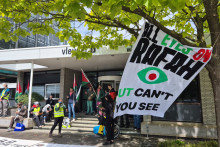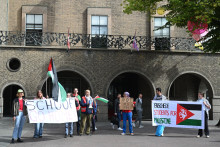Several pro-Palestinian activist groups will hold protests at train stations throughout the Netherlands on Monday evening. VVD leader Dilan Yesilgöz called the protests this weekend 'really terrible'. She also supported the statement of five local VVD parties that accused the NS of facilitating Jew-hatred by allowing the actions, which the railway company and several conductors were not happy about.
The criticism of the announced actions focuses mainly on the timing: exactly one year after the Hamas attack. Do you understand that criticism?
Van Dijk: 'No, although I understand that this date doesn't feel right to people who don't know much about the genocide. October 7 is being used by Benjamin Netanyahu and other Zionists to justify the genocide of the Palestinian people that has been going on for decades. We also protest against that narrative. This date is used to justify the most horrible crimes. What do you expect from us? That we are silent now, while dozens of children are murdered every day in Palestine and Lebanon?'
What does your protest look like tonight?
'We hold a sit-in, in which we recite stories, speeches and poems and reflect on all the deaths that have occurred. There is room for those who want to say something. Every civilian fatality is one too many, but we don't go along with the narrative that terrible things are happening on both sides, so being neutral is the best option. That's absurd. On the Palestinian side, there have been many more casualties and the population is being systematically oppressed and murdered.'
The leader of the VVD calls the action tasteless and talks about 'indirect anti-Semitism'. What's your take on that?
'Let me make it very clear that we are against anti-Semitism in any form. Anti-Semitism and anti-Zionism are two different things. Thousands of anti-Zionist Jews have already joined pro-Palestine movements. Yesilgöz, of course, knows what she's doing. She doesn't care about certain minorities, otherwise you wouldn't get into a cabinet with the PVV. She wants to quell these legitimate protests and even calls the watermelon anti-Semitic. Very bad and it makes me angry that someone with so much power says such stupid and dangerous things.
It endangers the safety of Jews and those who stand up for the Palestinian people. By calling the protests anti-Semitic, she is not taking our legitimate criticism of Israel seriously. She also trivializes real anti-Semitism, as you see at Forum for Democracy. She lumps that together.'
(Text continues below the photo.)

Caption: In May, the dies natalis was interrupted twice by protesters.
Your group was formed last year and you were visible on several occasions. How do you look back on that?
'It's not always easy. I have the impression that not many people from the UT community are politically engaged, unlike in other cities. I think that's due to several factors. In Amsterdam and Utrecht you already have certain political organizations, such as a strong climate movement and a communist or anarchist community. Here you don't have much. Yes, University Rebellion, but they are also small. The UT also mainly offers technical programmes, which are a bit further away from geopolitics or ethics. Few lessons here deal with what colonialism means today. That doesn't always make our job easy.'
Doesn't that inhibit you from protest over and over again?
'No, I work on the basis of a principle. There are a hundred people watching us, 95 of whom ignore us. That's not fun, but for the few people we might inspire, you do it. The other day a boy came up to us at a protest, with tears in his eyes. He was Palestinian, and it did him so much good that we showed that his culture matters. That's what you do it for, but the fact that we remain such a small group is quite tough.'
Are you still in talks with the Executive Board?
'We had a conversation last week, but for us that was the last conversation. After all, they are not conversations, in which you exchange arguments and then get somewhere. For us, the Executive Board remains vague, inconsistent and unfair. The rector, for example, talks about academic freedom so as not to break institutional ties, but it is not about academic freedom. It's just there and there are ethical frameworks. That is why we do not cooperate with the Taliban, Hamas or Iran. Why do we hold Israeli institutions, which are complicit in Israel's human rights violations, by a different standard? We're not going to talk anymore, it's not working.'
Will you remain active in the near future?
"Without a doubt. Next Tuesday we will give a lecture in which a Dutch man who lived in Palestine for twenty years talks about the history of the country. In addition, every Wednesday we hold a lunch march to the Spiegel and follow more lectures. But first, tonight's sit-in. I hope that many students and citizens will join.'





